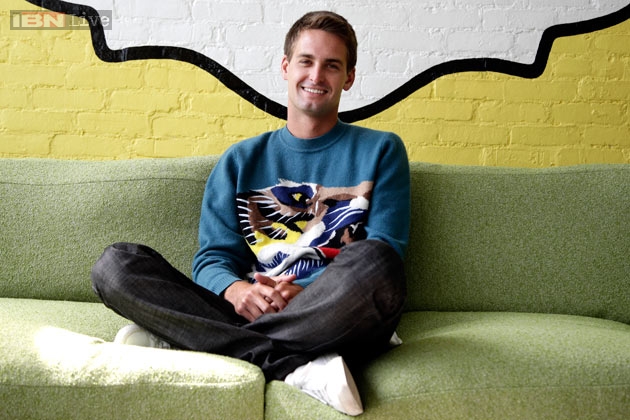Sony was hacked in November by a group that demanded it dropped the release of The Interview, a movie about two Americans plotting to assassinate North Korean leader Kim Jong-Un. All of the leaked emails and documents were made easily accessible last week when WikiLeaks loaded them into a searchable database.
One email provides particular insight into Snapchat’s mission for mobile monetisation. On 24 April 2014, Anthony Noto, who was co-head of global tech, media and telecom investment banking at Goldman Sachs at the time, sent an email to Snapchat CEO Evan Spiegel. Just a couple of months later, Noto joined Twitter as CFO.
The email was included in the leak because Spiegel forwarded it onto Sony Pictures CEO Michael Lynton, who also sits on the board at Snapchat. In it, Noto analyses Facebook’s Q1 2014 earnings with a particular eye on the company’s mobile revenue.
>See also: Does Facebook collect the text you decided against posting
Noto referred to a conversation he had with Spiegel the previous night about Facebook’s advertising revenue accelerating from 72% year-on-year to 82% year-on-year, which he called ‘remarkable’ and ‘a real positive for the sector’.
However, having delved deeper into the results, Noto realised the number of ad impressions at Facebook had actually declined by 17% year-on-year, which was offset by 118% growth in revenue per impression.
Noto attributed the decline in ad impressions to the shift in user habits from desktop to mobile, where there are fewer ads – but he was surprised to discover that mobile was monetising better than desktop at Facebook.
‘A key question here is why does mobile monetize better?’ he wrote. ‘Is it due to higher prices per click or higher click through rates?’
He said the latter would be ‘enormously positive’ because it would trigger more ad spending in mobile, but he would be ‘concerned’ if it was the former and would want to know how much advertisers’ mobile spend had increased year-on-year.
‘If the growth in spending on a same store basis (i.e. holding the number of advertisers from last year constant) is single digits year-on-year, then once everyone tries mobile ads on Facebook the growth rate of ad revenue will plummet from triple digits to high single digits over night.’
As Facebook had only revealed the overall number of ad impressions, Noto also mused over the difference between desktop and mobile in that category.
If desktop ad impressions had grown due to the significant increase in the number of ads Facebook placed on a page, the impact of the shift from desktop to mobile on ad impressions was actually ‘way worse’, he said.
But if traditional desktop advertisers had genuinely grown their mobile spend significantly, rather than first-time advertisers skewing the figures, Noto said Facebook is ‘crushing it’.
However, Noto also believed the growth in Facebook’s desktop revenue was likely to fall negative in 2014, which could lead it to ‘an air pocket on growth’.
More tellingly, Noto said if the growth in mobile revenue was indeed driven by higher click through rates, Facebook will be viewing products with significant mobile traction, like Snapchat, as more valuable for acquisition.
Snapchat is one of the top mobile brands in the world, along with Facebook, Twitter, YouTube, and Instagram – but the only still operating as a start-up. Its privacy-favouring messaging app has grown at a rapid rate since its 2011 launch, and is now looking to expand into mobile video.
It famously turned down a $3 billion acquisition offer by Facebook in 2013, and other leaked Sony emails indicate Twitter may be eyeing up an offer too.
‘Specifically, if ads on mobile are more engaging for consumers and more relevant than desktop ads, the addressable ad market for mobile will be bigger than the desktop ad market and the valuations of mobile companies will be greater,’ wrote Noto. ‘This would be a very positive factor for Snapchat.
‘If Facebook knows this to be true it would be willing to pay a higher valuation for mobile companies than other acquirers because Google, Yahoo, Microsoft etc. haven’t scaled [enough] in mobile to understand these powerful secular trends, and, in essence, they [will] undervalue mobile, under invest and fall farther and farther behind.’
>See also: War on the data beasts: don’t let Google, Facebook et al control your digital lives
Speaking of his anger about the Sony hack in a memo to his employees in December, Spiegel lamented the leaked insights into Snapchat’s three-year roadmap to become a revenue-generating company that can lead the monetisation of mobile.
‘I felt like I was going to cry all morning, so I went on a walk and thought through a couple things,’ he wrote. ‘I even ran into one of my high school design teachers. She gave me a huge hug. I really needed it.
‘We keep secrets because we get to do our work free from judgement – until we’re ready to share it. We keep secrets because keeping secrets gives you space to change your mind until you’re really sure you’re right.’
Noto’s email to Spiegel indicates the Snapchat boss is keeping a close eye on Facebook as he seeks a way to prosper in the mobile communications market.
Noto is one of a growing number of people to leave Wall Street for Silicon Valley. Last month, Google appointed Morgan Stanley’s Ruth Porat as its new CFO, while Snapchat tapped Credit Suisse’s Imran Khan to be its chief strategy officer and Square turned to former Goldman Sachs MD Sarah Friar to head up its finances.










